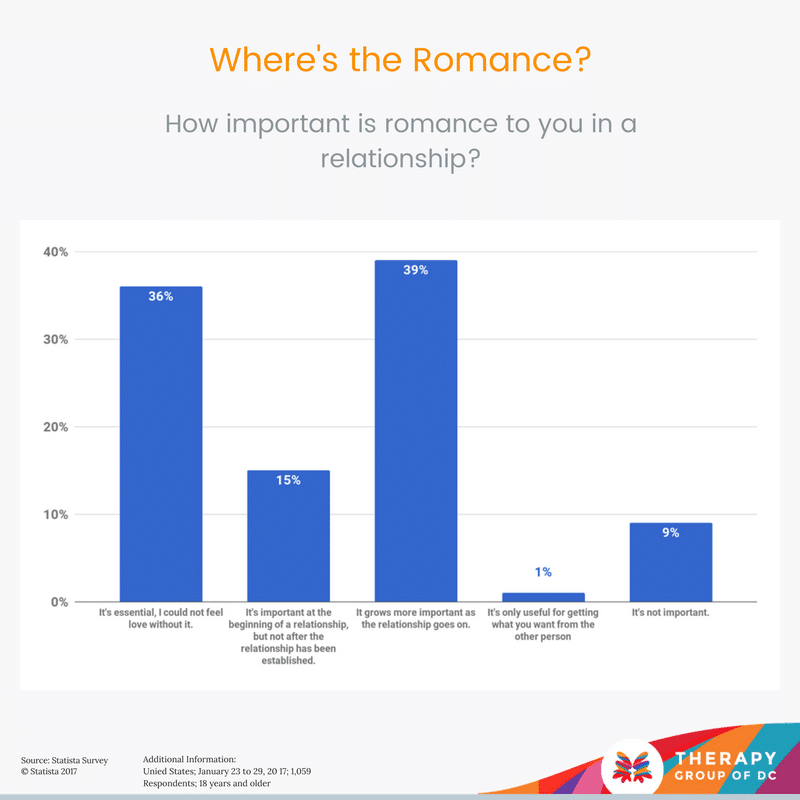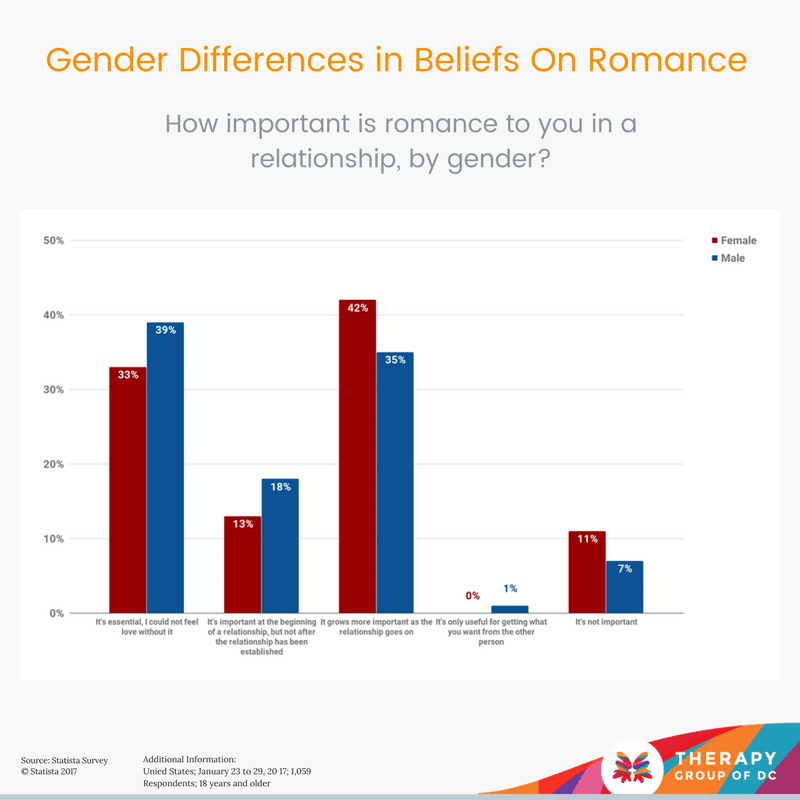How Important Is Romance In a Relationship?
Why Romance is Important in a Relationship?
Humans are social creatures. We value human interaction and developing close personal relationships. Perhaps the most significant relationship we have is the bond we share with a partner or spouse. But how important is romance in this relationship?
The results of a recent Statista survey sheds light on the almost universal significance of romance in relationships. They may even make you question the assumptions of men’s versus women’s perspectives on the significance of romance in a relationship. Discover how romance stacks up in relationships and evokes compelling feelings that reinforce love and desire.
1. What is Romance in a Relationship?
Romance in a relationship is the emotional connection and affection that partners share with each other. It’s the spark that ignites the flame of love and keeps it burning bright. Romance is not just about grand gestures or expensive gifts; it’s about the little things that show you care, appreciate, and value your partner. It’s about creating a sense of joy and connectedness that brings happiness and fulfillment to your relationship. Whether it’s a simple note left on the fridge, a spontaneous hug, or reminiscing about past hang out spots, these small acts of adoration keep the romance alive and thriving.
2. Vast Majority of People Find Romance To Be a Vital Part of Romantic Relationships
Romance can be described as the expression of one’s strong affections, or one’s deep and strong emotional desires to intimately connect with someone. Romantic love plays a vital role in fostering intimacy and connection between partners, distinguishing between physical attraction and emotional bonds. As shown in the chart below by adding up the first three columns, 90 percent of respondents in a recent survey agree that romance in a relationship is important. From these results, it’s clear that romance holds a strong significance and is an almost universally hoped-for element of a relationship.
3. Romance May Affect Whether or Not You’re in Romantic Love
Over one-third of the survey’s respondents – 36% – indicated that they would not be in love if the relationship lacks romance. This is important to consider. A healthy love life signals a strong desire to connect at a profound level and helps fuse the exclusive bond we share with our partner.
4. The Significance of Romantic Gestures Heightens As a Relationship Grows (Gender Plays a Role, Too)
Long term relationships, at any stage, help solidify our bond and remind us of our relative uniqueness to our partners. Notably, the study revealed that most respondents believe that romance’s level of significance in a relationship grows as the relationship grows.
These results also show notable differences based on gender. For example, nearly two out of five men noted that they could not feel love without romance, while more women than men indicated that romance was not as vital. These findings challenge assumptions that women universally seek romance more than men. And, it also seems to hint that perhaps men might not be as single-minded in their expression of love and romance outside of sex.
5. Creating Romance in Your Relationship
Creating romance in your relationship is not rocket science, but it does require effort and intention. Here are some tips to help you create romance in your relationship:
- Start with small gestures: Surprise your partner with their favorite coffee or flowers.
- Schedule regular date nights: Set aside time for just the two of you to reconnect and have fun.
- Practice appreciation romance: Show your partner that you appreciate them by writing love notes or surprise gifts.
- Keep the spark alive: Try new things together, like a new hobby or a weekend getaway.
- Communicate openly: Talk to your partner about what they like and dislike, and be open to feedback.
Remember, creating romance is not a one-time event, but an ongoing process that requires effort and commitment from both partners. By consistently incorporating these practices into your everyday life, you can keep the romance alive and thriving.
6. The Role of Intimacy in Romantic Relationships
Intimacy is a crucial aspect of romantic relationships. It’s not just about physical intimacy, but also emotional intimacy. Emotional intimacy is about feeling connected, understood, and accepted by your partner. It’s about creating a sense of safety and trust that allows you to be vulnerable and open with each other.
In romantic relationships, intimacy is essential for building a strong emotional connection. It’s about sharing your thoughts, feelings, and desires with each other, and being receptive to each other’s needs. Intimacy is also about creating a sense of closeness and togetherness that brings joy and fulfillment to your relationship.
To create intimacy in your relationship, try the following:
- Practice active listening: Pay attention to your partner’s needs and desires.
- Be vulnerable: Share your thoughts and feelings with your partner.
- Create a sense of safety: Establish a safe and trusting environment where you both feel comfortable being open and vulnerable.
- Prioritize quality time: Spend quality time together, doing things that bring you joy and closeness.
Remember, intimacy is a two-way street that requires effort and commitment from both partners. By prioritizing intimacy, you can create a stronger, more fulfilling romantic relationship.
Final Thoughts on Keeping Romance Alive
This survey underscores our belief and confirms what we see when doing therapy with couples in DC. That is, many individuals find romance as an essential part of their relationships. However, the significance of a romantic relationship can have a different meaning for you versus your partner or spouse.
If it’s important to you but is absent in your relationship, it can have a profound negative effect on you and your relationship. Said another way, a loss of romance and the absence of powerful or compelling feelings can help explain current challenges in your relationship.
Putting romance back into your relationship is possible.
Through Marriage and Couples Therapy and a high level of commitment and growing respect for each other, our DC marriage and couples therapists can help you to take the necessary steps to achieve warmth and connection in your relationships. We also combine specialties and offer gay and lesbian couples and marriage therapy.
Contact us today if we can be of help to you and your relationship.
Frequently Asked Questions About Romance in Relationships
Why is romance important in our lives?
Romance plays a crucial role in enhancing feelings of love and intimacy in a relationship. It helps to keep the spark alive and fosters a sense of joy and connectedness between partners. Romance is a major element in creating a healthy relationship, contributing to both mental health and ultimate happiness.
Can a relationship last without romance?
While some relationships may survive without romance, they often lack fulfillment and can become dull over time. Romance feeds the emotional and physical intimacy that is necessary for a strong and lasting bond. Without romance, partners may feel underappreciated, leading to potential emotional breakdowns and relationship failure.
What is the aim of romance?
The aim of romance is to convey affection, appreciation, and respect for your partner. It involves initiating romantic activities and small gestures that enhance bonds and create a loving relationship. Romance is about practicing romance in everyday life to prolong feelings of passionate love and maintain a strong desire for each other.
How can I create romance in my relationship?
Creating romance involves both small acts collectively and bigger gestures. Start by planning regular date nights, writing love letters, or leaving funny greeting cards for your partner. Try new activities together, like visiting an adult book store or attending parties, to keep the excitement alive. These efforts will add romance to your relationship and make it stronger.
What if my partner and I have different views on romance?
It’s normal and necessary for partners to have different perspectives on romance. Open communication is key to understanding each other’s needs and desires. Consider seeking advice from a marriage therapist if needed, as marriage demands work and respect romancing is essential for a fulfilling partnership.



